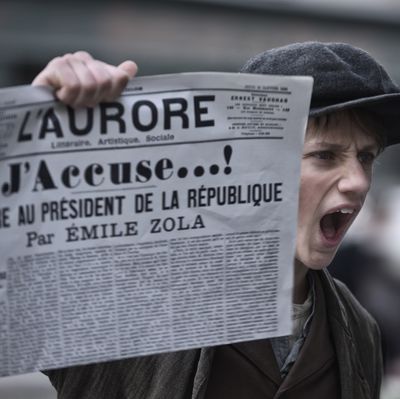
It’s ten past 2 p.m. on a hot afternoon at the Venice Film Festival. The team attending the press conference for competition film An Officer and a Spy (J’Accuse) — an impressively meticulous recreation of France’s notorious Dreyfus Affair, in which an innocent Jewish officer was convicted of treason and banished to a prison island — are lined up neatly at the podium. But it feels like all of them, even the jostling, expectant journalists, are arranged around an absence — that of the film’s director, Roman Polanski, who, it bears eternal repeating, fled the U.S. for France in early 1978 before he could be sentenced following his conviction for unlawful sex with a 13-year-old. He has not been to the U.S. since; meanwhile, three other women have alleged that Polanski sexually assaulted them. In 2018, the Academy that awarded him the 2002 Oscar for Best Director expelled him.
The Officer film team, including cast member Emmanuelle Seigner, Polanski’s third wife, graciously accept a warm reception. The film’s Italian co-producer, Luca Barbareschi (who’s a former member of Italian parliament and one of four actors erroneously believed to have been murdered during the making of Cannibal Holocaust!), is the first to the mic. Speaking in Italian — forgive the imperfect translation — he states they will be taking questions about the production and the performances, but nothing else. “This is a film festival, not a moral trial,” he says. Strangely, given that Barbareschi has essentially just muzzled them, the journalists applaud.
French actor Louis Garrel, who plays Dreyfus, charms the Italian contingent by chatting affably in what seems (to a non-fluent listener) to be articulate, colloquial Italian. The film’s star, Jean Dujardin, speaking in French, has nothing but praise for a director “of great intelligence” — indeed, with a twinkle, he wishes to all actors the good fortune of one day working with Polanski. And when one journalist makes a gentle, diplomatic foray into contested territory, the producers shut her down, and are again met with applause. After exactly the 30 advertised minutes, the press conference is over, a great deal left unsaid.
One of the subjects not broached was 2019 Venice Jury President Lucrecia Martel’s refusal to attend the film’s gala, at which Polanski appeared via Skype. (The film received a standing ovation when it finally screened for competition.) The film’s producers threatened to pull Officer from the competition if Martel did not apologize; instead she clarified that while she would not attend an event celebrating Polanski, she did support the film’s inclusion in the lineup. The producers were mollified and Martel attended the press screening of the film this morning instead.
Still, Martel’s principled absence from the red-carpet premiere, Polanski’s legally advisable nonattendance at the junket (Italy has an extradition treaty with the U.S.), and the lack of any challenging questions from the press corps: All these absences have been tactfully managed so as to stifle the kind of controversy Polanski himself hinted at, in an interview carried in the film’s press notes. Drawing direct comparison between himself and the persecuted Alfred Dreyfus, he stated, “I can see the same determination to deny the facts and condemn me for things I have not done.”

